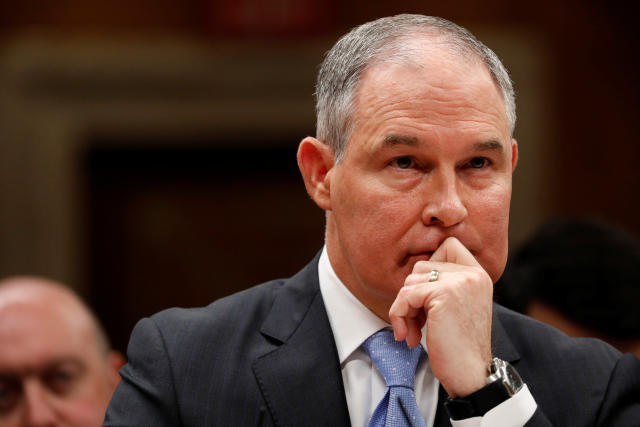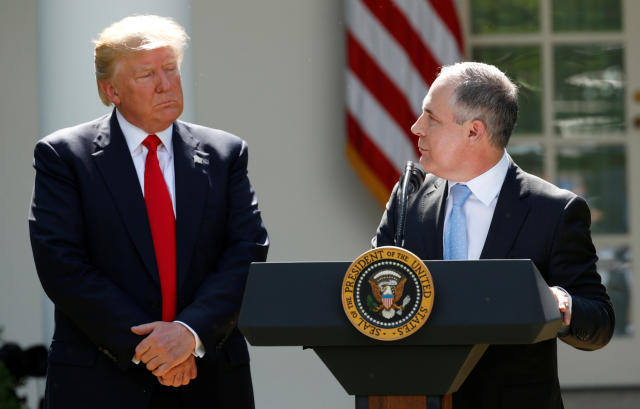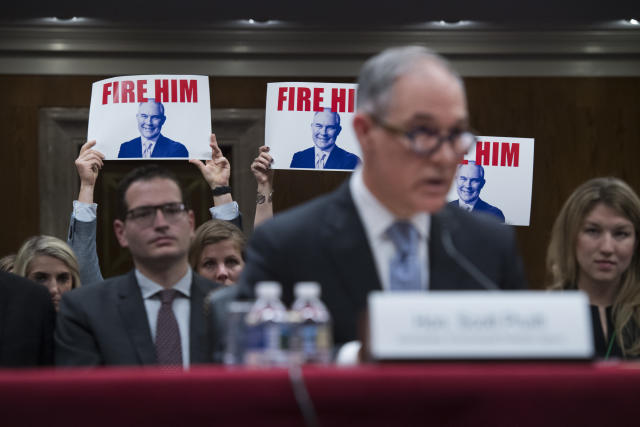
This article is more than
7 year oldI have accepted the resignation of Scott Pruitt as the Administrator of the Environmental Protection Agency. Within the Agency Scott has done an outstanding job, and I will always be thankful to him for this. The Senate confirmed Deputy at EPA, Andrew Wheeler, will...
— Donald J. Trump (@realDonaldTrump) July 5, 2018
...on Monday assume duties as the acting Administrator of the EPA. I have no doubt that Andy will continue on with our great and lasting EPA agenda. We have made tremendous progress and the future of the EPA is very bright!
— Donald J. Trump (@realDonaldTrump) July 5, 2018
During his nearly 17 months in office, Pruitt, 50, sought to dramatically remake the EPA, contracting the budget, eliminating landmark regulations and politicizing scientific research, giving industry an outsize role in shaping the federal rules by which it plays. He played a decisive part in convincing President Donald Trump to withdraw the United States from the Paris climate accord.
The sudden exit of the nation’s 14th and shortest-serving EPA administrator curtails the ambitious ascent of a career politician. Pruitt, who made his name on the national stage by repeatedly suing to block EPA regulations as Oklahoma’s attorney general, flirted with becoming Trump’s next attorney general and was said to be considering a run for Senate or governor in the Sooner State. Allies said Pruitt plotted a run for the presidency as early as 2024.

But Pruitt faced intense pressure to resign over accusations of corruption and taxpayer waste after an avalanche of scandals. It started in March when a report emerged detailing his $50-a-night sweetheart deal to rent a room in a luxury Capitol Hill townhouse linked to a gas industry lobbying firm, Williams & Jensen. The EPA’s ethics lawyers rushed to retroactively greenlight the arrangement, but struggled to defend the administrator after news broke that his adult daughter used the residence.
Deepening the perception of a conflict of interest, Williams & Jensen’s clients won approval from the EPA during the time Pruitt lived at the condominium, paying well below market rate.
Even former New Jersey Gov. Chris Christie (R), whose so-called Bridgegate controversy captured national attention and thwarted his presidential ambitions, remarked on April 1 that Pruitt’s scandal seemed too clear-cut to explain away.
“I don’t know how you survive this one, and if he has to go, it’s because he never should have been there in the first place,” Christie said on ABC News.
In early April, three Republican House members joined the chorus calling for Pruitt’s resignation. The president continually indicated his support for Pruitt, telling the administrator to “keep his head up” and “keep fighting” and praising Pruitt in June amid ongoing criticism from others.
“EPA is doing really, really well,” Trump said at an event with his Cabinet. “And you know, somebody has to say that about you a little bit.”

Pressure intensified on Pruitt after it was reported he tried to abuse his vehicle’s emergency sirens to cut through traffic, and that the administrator reassigned, demoted or forced out five EPA officials who challenged his “unusually large spending.”
On April 6, Trump bucked efforts by his chief of staff, John Kelly, to fire Pruitt, according to the Wall Street Journal. The president tweeted his support for the administrator, saying he was “under siege” from the “Fake News Media.” One former EPA official compared Trump’s steadfast support for Pruitt to his refusal to withdraw his endorsement for former Alabama Senate candidate Roy Moore (R), even as accusations mounted that Moore had sexually harassed and assaulted teen girls when he was in his 30s.
For weeks, it seemed Pruitt would weather the firestorm. But in mid-April fresh details from a federal investigation emerged, new reports on past shady dealings came out and pressure mounted from inquiries being conducted by the EPA’s internal watchdog, the top federal ethics watchdog and the Republican-led House Oversight and Government Reform Committee.
The White House started telling Republicans to hold off on defending Pruitt, according to a Bloomberg report. On April 23, three of Pruitt’s staunchest allies, including Sen. James Inhofe (R-Okla.), said they supported holding hearings on the Senate Environment and Public Works Committee to investigate Pruitt’s actions.
By early May, senior White House officials were encouraging Trump to fire Pruitt, The New York Times reported. One aide told the publication that the EPA chief’s troubles were “a bottomless pit.”
The cascading series of controversies at the EPA followed months of criticism over Pruitt’s first-class travel accommodations. He regularly spent $2,000 to $2,600 on first-class flights to Oklahoma, and often booked $1,400 to $4,000 flights to Boston, New York and Corpus Christi, Texas, according to The Washington Post. He routinely stayed in luxury hotels.
His international travel expenses soared into the six figures. In June, a trip to an environmental summit in Italy cost over $120,000, while a December trip to Morocco to promote liquefied natural gas ― a bizarre responsibility for the nation’s environmental regulator to take on ― reportedly cost nearly $40,000. In Italy, Pruitt dined with Vatican treasurer Cardinal George Pell, a climate change denier who’s since been charged with child sex abuse, according to documents unearthed by The New York Times. And The Daily Beast revealed that during his brief trip to Rome, Pruitt spent far more time at private dinners and tours than working.
The criticism deepened when The Washington Post reported the EPA had considered leasing a private jet for Pruitt. That plan, which the agency ultimately did not pursue, could potentially have cost about $100,000 a month, according to one estimate.

Pruitt also faced heat after it was reported he used a loophole in the Safe Drinking Water Act to give two political appointees raises after the White House rejected the request. In a heated Fox News interview on April 4, Pruitt denied knowing about the raises. But an internal email published later in the month showed that he personally signed off on the decision.
Pruitt’s scandals got more bizarre as time went on. In one week it was reported he had ordered an aide to set up a call with the chairman of Chick-fil-A to discuss the possibility of his wife becoming a franchisee of the growing fast-food chain, and also that he paid $3,230 in taxpayer money for personalized journals and pens, priced at $130 each. It was also revealed Pruitt had asked his aide Millan Hupp to try to buy “an old mattress” from the Trump International Hotel in Washington, something she said wasn’t for EPA business, to her knowledge.
Pruitt is arguably the highest-profile Trump administration official to depart amid a firestorm over ethics. Health and Human Services Secretary Tom Price resigned in September after spending over $1 million on private flights. Brenda Fitzgerald, director of the Centers for Disease Control and Prevention, stepped down after buying shares of a tobacco company, a perceived bet against her own work as a top public health official.
But, despite legal challenges halting more than one-third of his regulatory rollbacks, Pruitt earned Trump’s respect as an effective champion of his deregulatory agenda, upending work at his agency to combat climate change and furiously erasing former President Barack Obama’s environmental legacy.
Environmental groups may have little time to celebrate Pruitt’s ouster.
Andrew Wheeler, the EPA’s newly confirmed No. 2 and a likely contender to become the administrator, is a climate change-denying former coal lobbyist. His four years working at the EPA’s Office of Pollution Prevention and Toxics under Presidents George H.W. Bush and Bill Clinton earned him a reputation as an actor capable of pursuing Trump’s agenda without hitting the legal snares that slowed down some of Pruitt’s decisions in court. He is expected to become the acting administrator as of Monday.
Another potential pick to replace Pruitt is William Wehrum, the powerful assistant administrator of the Office of Air and Radiation, who rejects climate science and fought to undermine clean air rules and weaken mercury standards as a lawyer for the fossil fuel industry.
Chris D’Angelo contributed to this report.
This is a developing story. Check back for updates.
This article originally appeared on HuffPost.